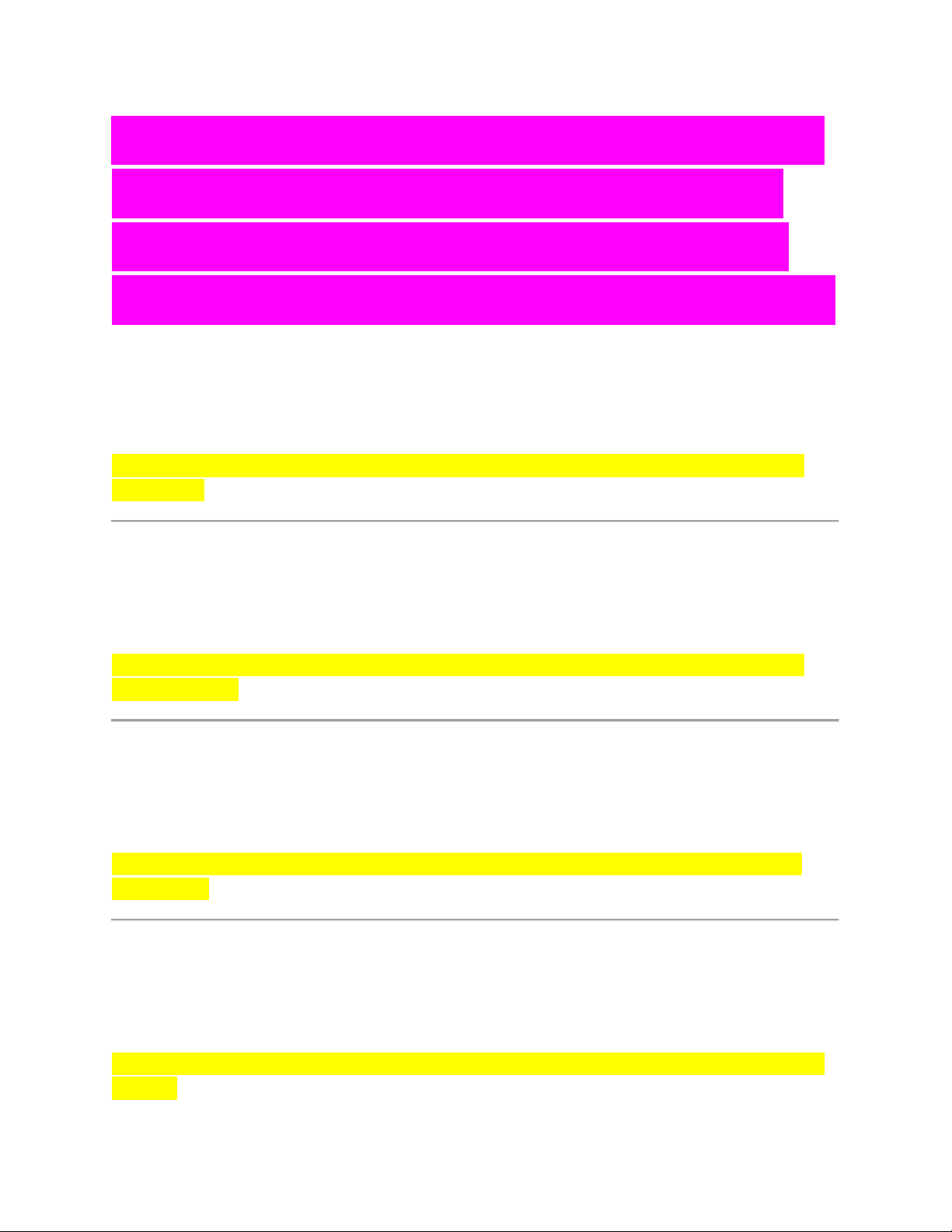
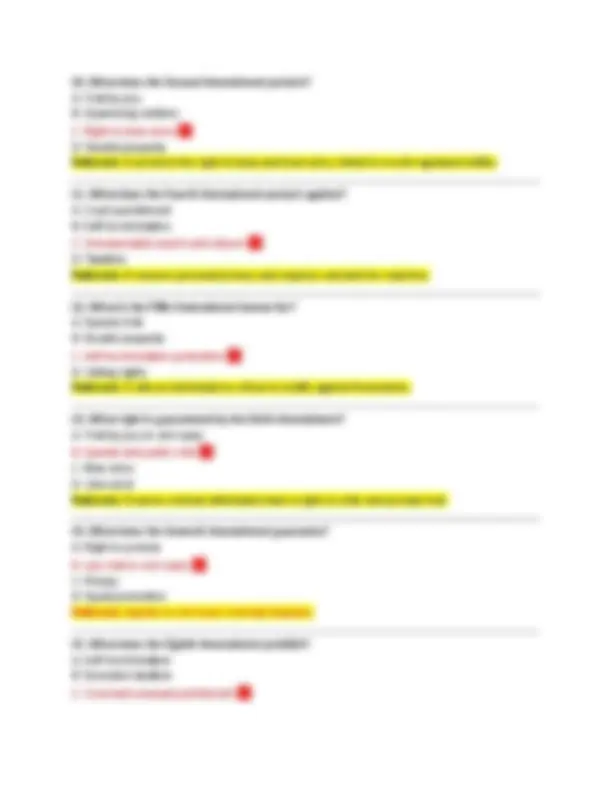
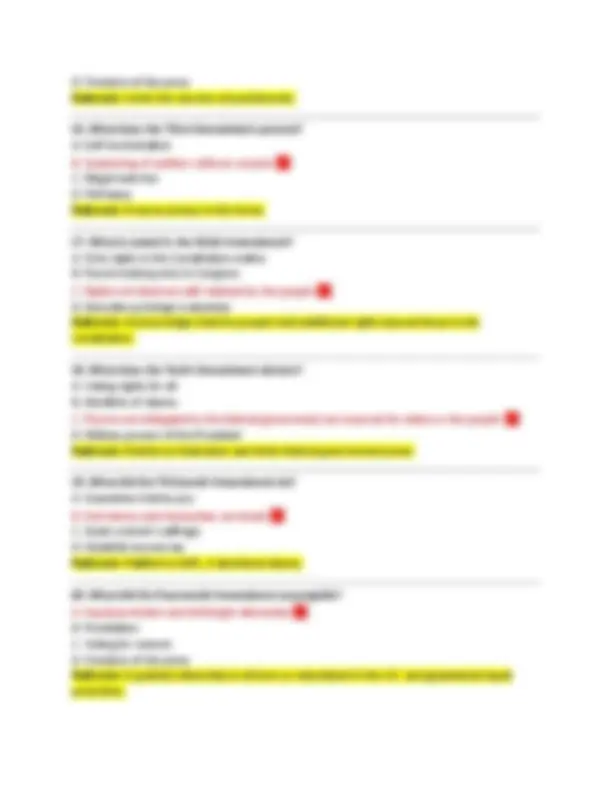
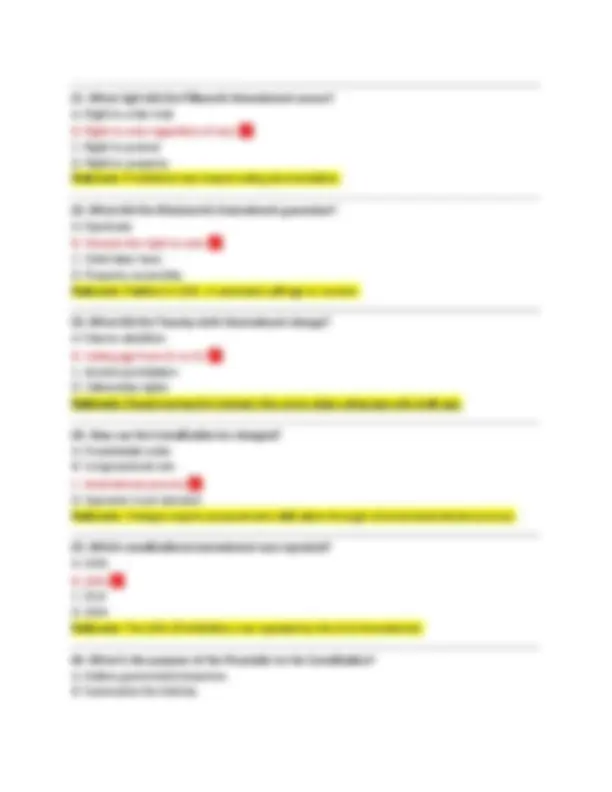
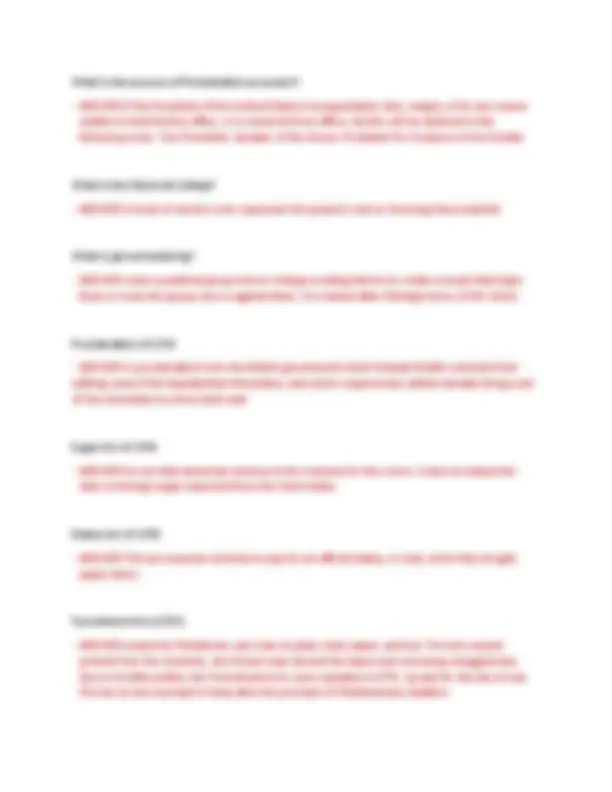
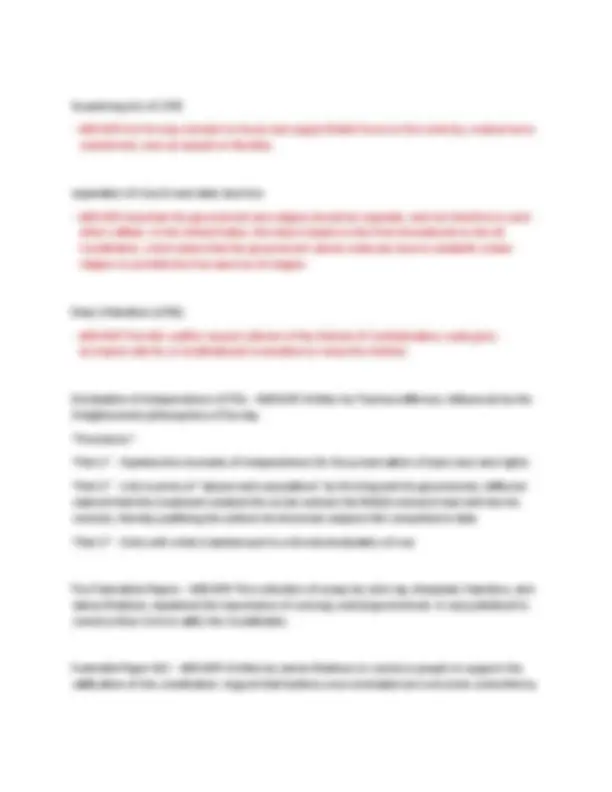
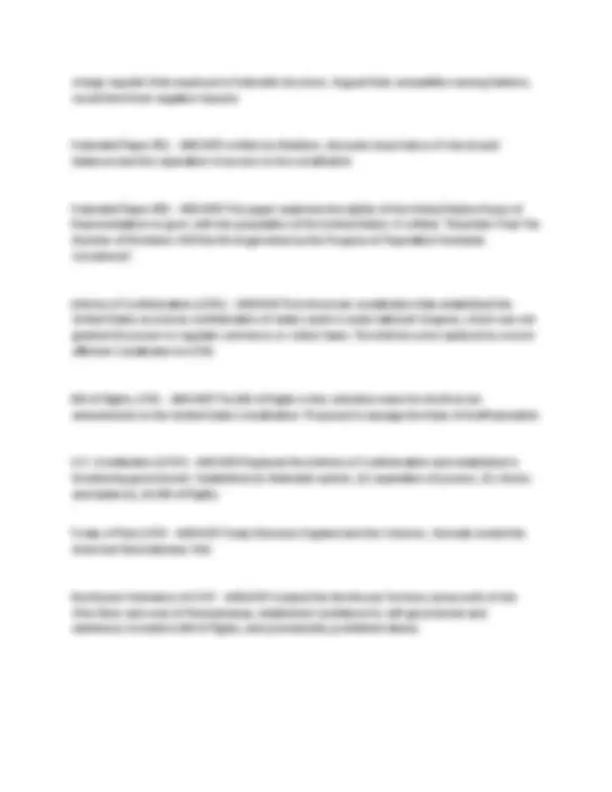
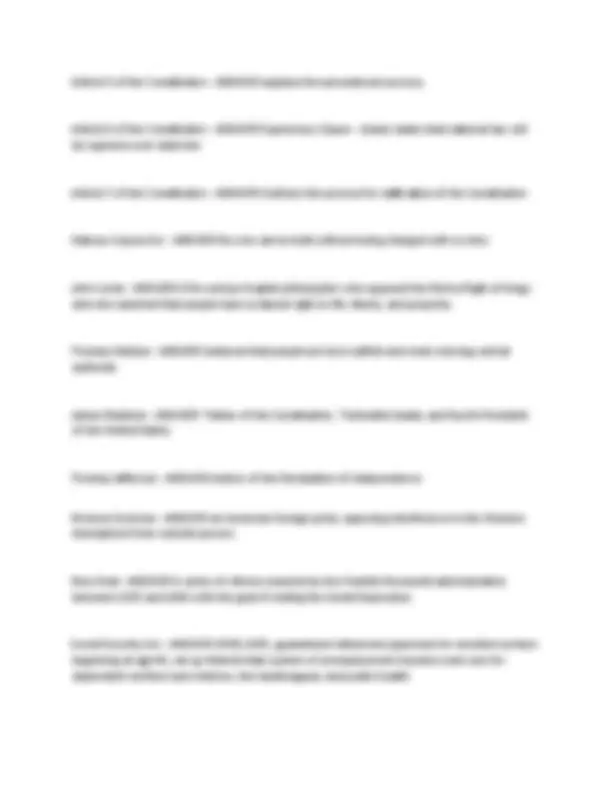
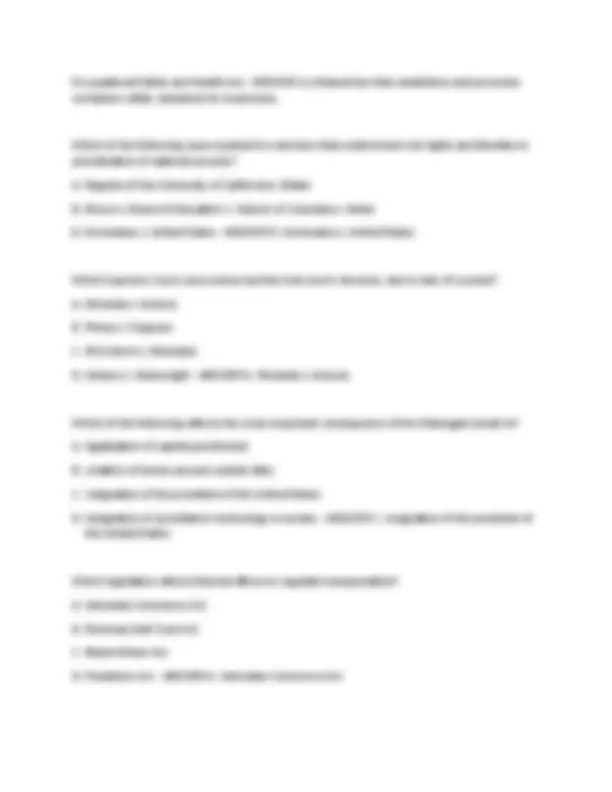
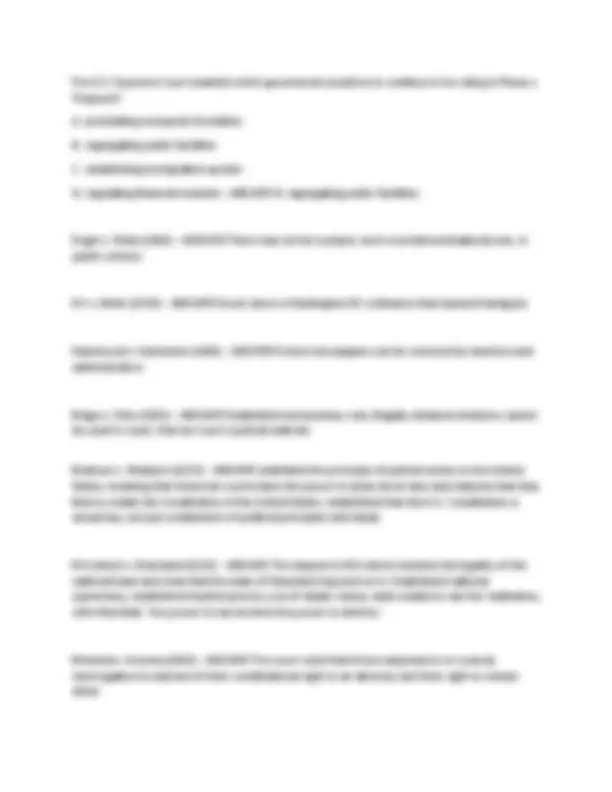
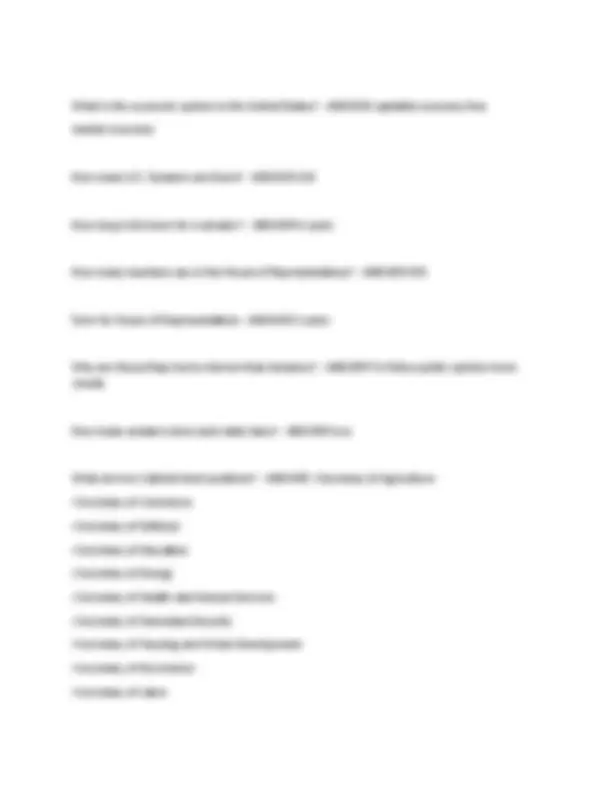
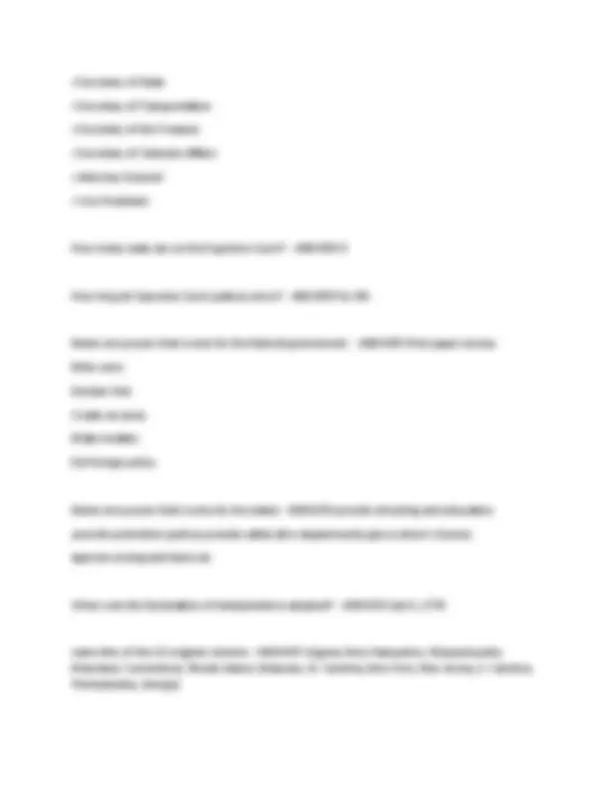
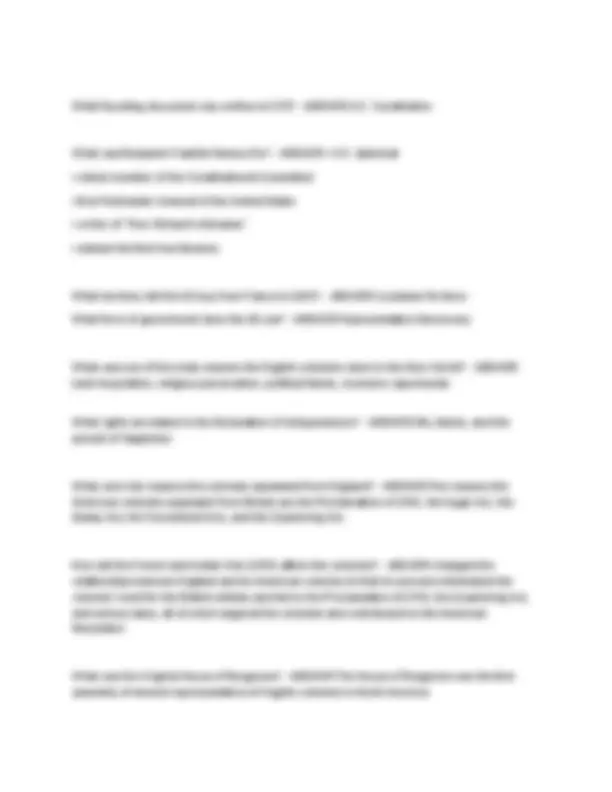
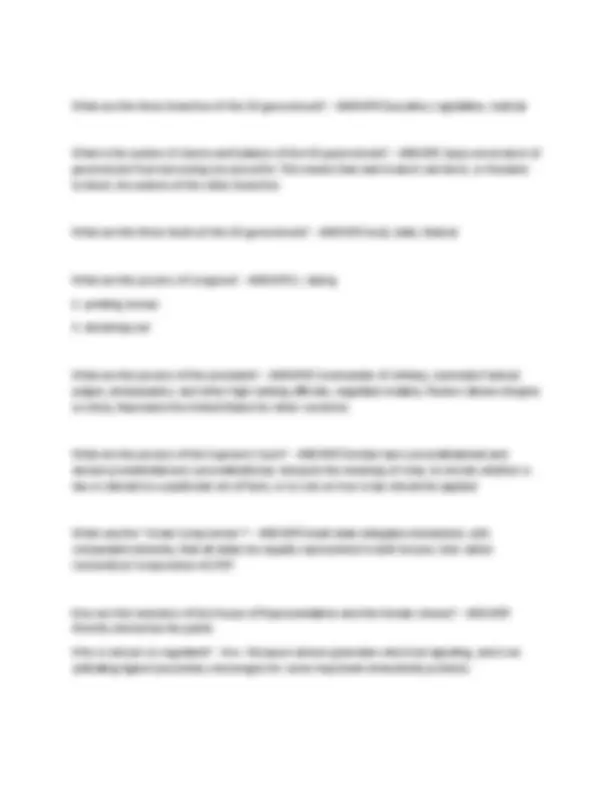
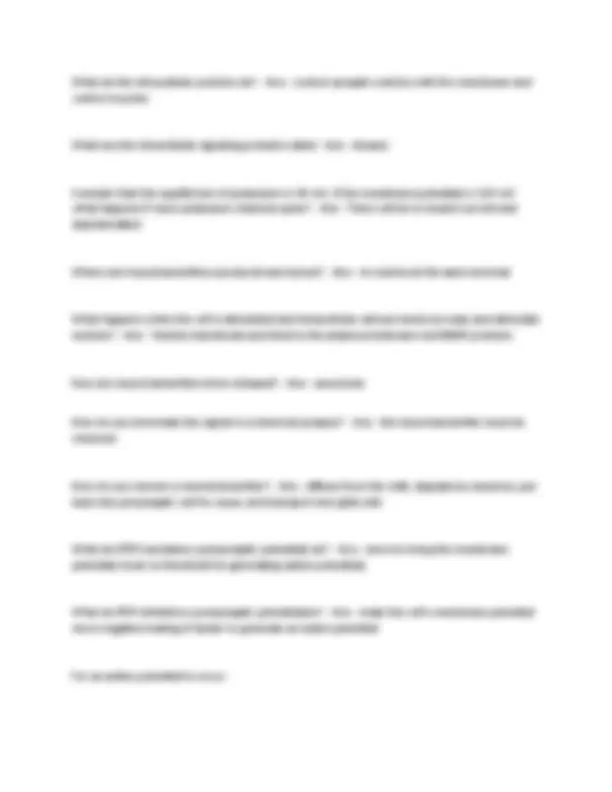
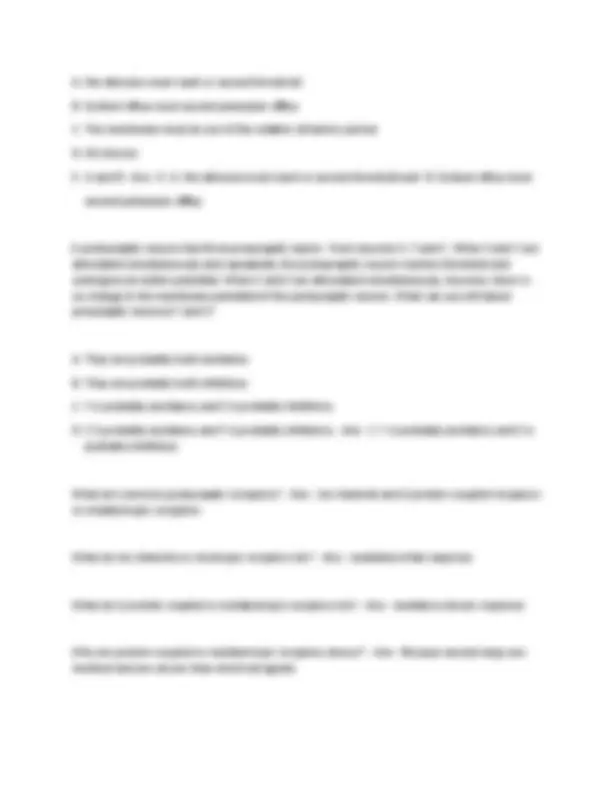
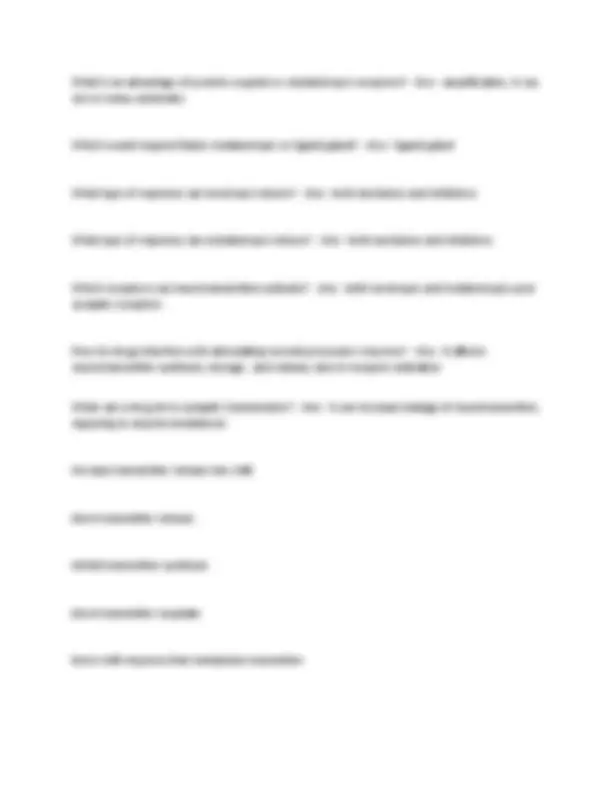
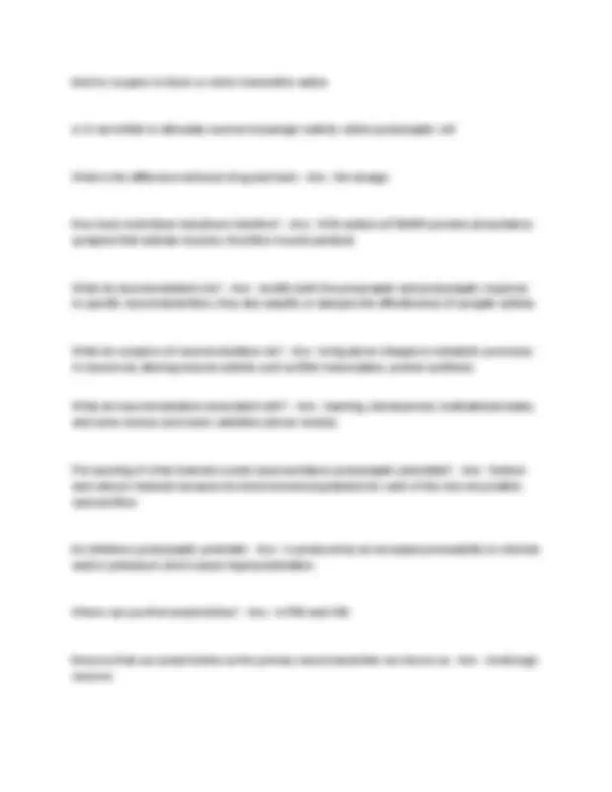
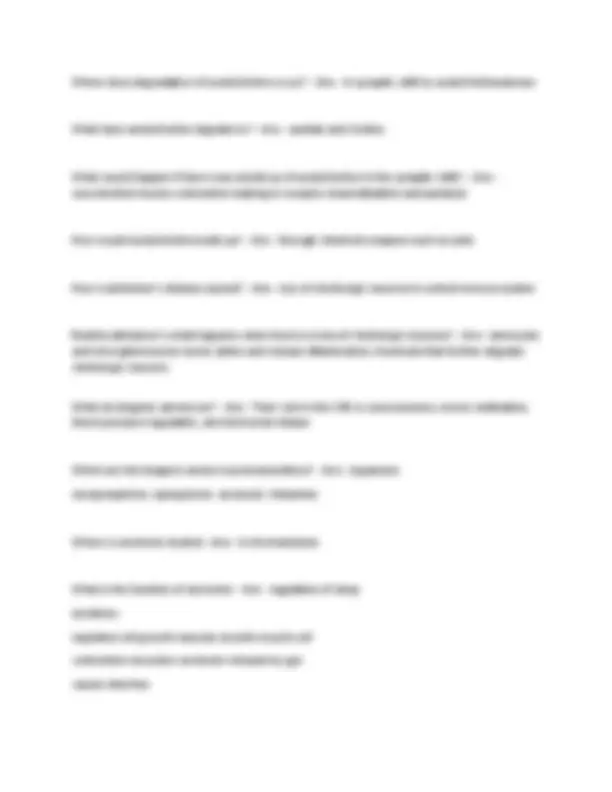
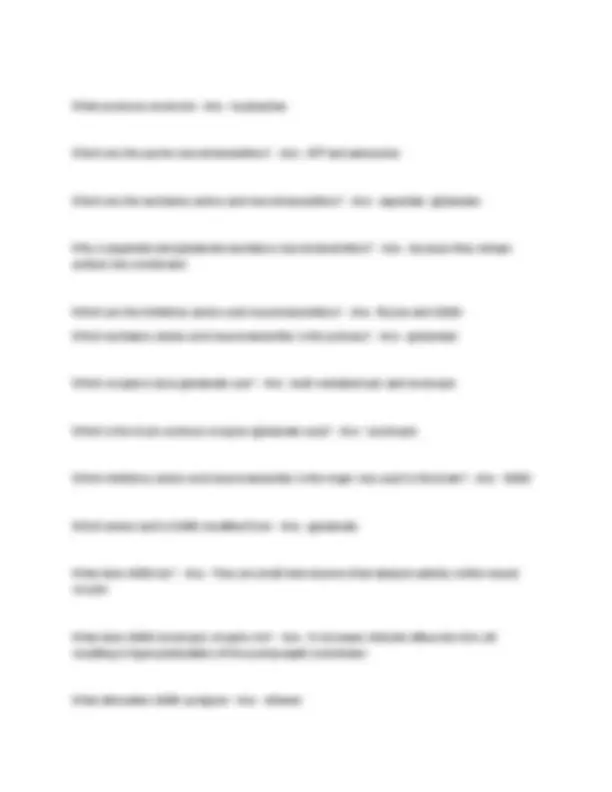
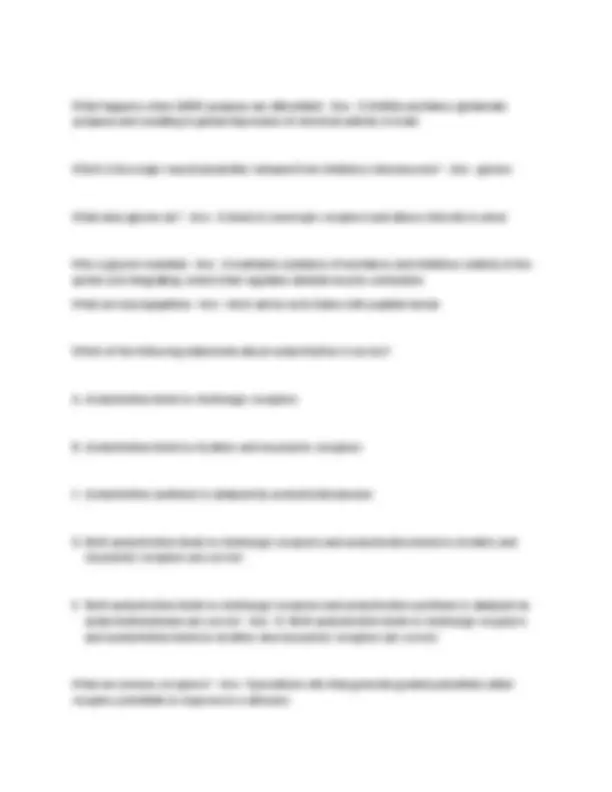
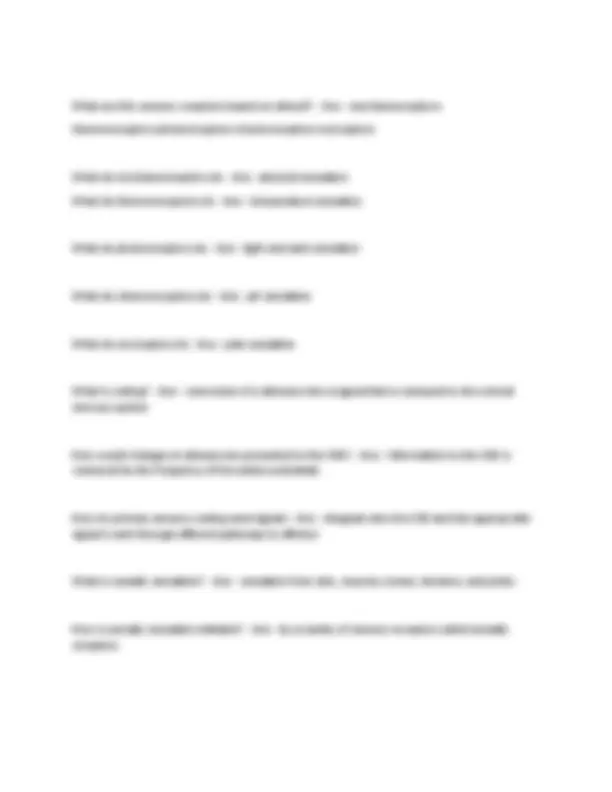
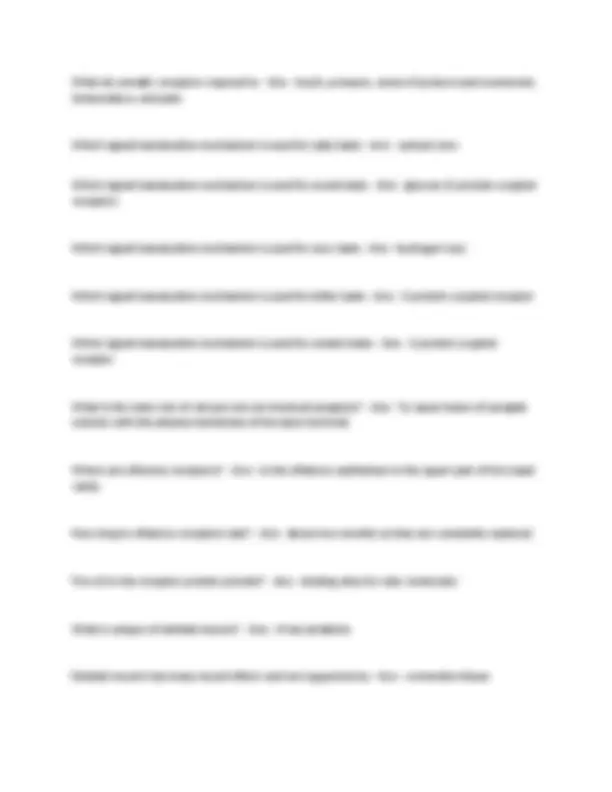



Study with the several resources on Docsity

Earn points by helping other students or get them with a premium plan


Prepare for your exams
Study with the several resources on Docsity

Earn points to download
Earn points by helping other students or get them with a premium plan
Community
Ask the community for help and clear up your study doubts
Discover the best universities in your country according to Docsity users
Free resources
Download our free guides on studying techniques, anxiety management strategies, and thesis advice from Docsity tutors
1. What are two holidays that honor members of the armed forces? A. Labor Day and Memorial Day B. Memorial Day and Veterans Day ✅ C. Veterans Day and Independence Day D. Armed Forces Day and Thanksgiving Rationale: Memorial Day honors those who died in military service; Veterans Day honors all who served. 2. From where does the US government get its power? A. Congress B. The Supreme Court C. The President D. The consent of the people ✅ Rationale: The U.S. government is based on popular sovereignty, meaning its power derives from the people. 3. Where was the original capital of the US? A. Boston B. Philadelphia C. New York City ✅ D. Washington, D.C. Rationale: New York City served as the first capital under the Constitution before moving to Philadelphia.
Typology: Exams
1 / 31

This page cannot be seen from the preview
Don't miss anything!
























1. What are two holidays that honor members of the armed forces? A. Labor Day and Memorial Day B. Memorial Day and Veterans Day ✅ C. Veterans Day and Independence Day D. Armed Forces Day and Thanksgiving Rationale: Memorial Day honors those who died in military service; Veterans Day honors all who served. 2. From where does the US government get its power? A. Congress B. The Supreme Court C. The President D. The consent of the people ✅ Rationale: The U.S. government is based on popular sovereignty, meaning its power derives from the people. 3. Where was the original capital of the US? A. Boston B. Philadelphia C. New York City ✅ D. Washington, D.C. Rationale: New York City served as the first capital under the Constitution before moving to Philadelphia. 4. What is Common Law? A. Laws passed by Congress B. Regulations made by agencies C. Judicial interpretations and precedents ✅ D. Tribal laws Rationale: Common law develops through court decisions and legal precedents, not legislative statutes.
5. What is the U.S. judicial system based on? A. International law B. Religious law C. Constitution, statutes, and common law ✅ D. Executive orders Rationale: The system is built on the Constitution, laws passed by legislatures, and judicial interpretations. 6. Which is the supreme law of the United States? A. The Declaration of Independence B. The Bill of Rights C. U.S. Constitution ✅ D. Federal statutes Rationale: The Constitution is the highest form of law and the foundation of all U.S. governance. 7. How many amendments does the U.S. Constitution have? A. 10 B. 27 ✅ C. 20 D. 30 Rationale: As of now, there are 27 amendments. 8. What are the first ten amendments to the Constitution called? A. Federalist Papers B. The Bill of Rights ✅ C. The Articles of Confederation D. The Declaration of Rights Rationale: These amendments protect individual liberties and are known collectively as the Bill of Rights. 9. What rights are protected by the First Amendment? A. Voting rights B. Trial by jury C. Free speech, press, religion, assembly, petition ✅ D. Right to bear arms Rationale: These are the five freedoms explicitly protected.
D. Freedom of the press Rationale: Limits the severity of punishments.
16. What does the Third Amendment prevent? A. Self-incrimination B. Quartering of soldiers without consent ✅ C. Illegal searches D. Poll taxes Rationale: Ensures privacy in the home. 17. What is stated in the Ninth Amendment? A. Only rights in the Constitution matter B. Powers belong only to Congress C. Rights not listed are still retained by the people ✅ D. Executive privilege is absolute Rationale: Acknowledges that the people hold additional rights beyond those in the Constitution. 18. What does the Tenth Amendment declare? A. Voting rights for all B. Abolition of slavery C. Powers not delegated to the federal government are reserved for states or the people ✅ D. Military powers of the President Rationale: Reinforces federalism and limits federal government power. 19. What did the Thirteenth Amendment do? A. Guarantee trial by jury B. End slavery and involuntary servitude ✅ C. Grant women’s suffrage D. Establish income tax Rationale: Ratified in 1865, it abolished slavery. 20. What did the Fourteenth Amendment accomplish? A. Equal protection and birthright citizenship ✅ B. Prohibition C. Voting for women D. Freedom of the press Rationale: It granted citizenship to all born or naturalized in the U.S. and guaranteed equal protection.
21. What right did the Fifteenth Amendment secure? A. Right to a fair trial B. Right to vote regardless of race ✅ C. Right to protest D. Right to property Rationale: Prohibited race-based voting discrimination. 22. What did the Nineteenth Amendment guarantee? A. Equal pay B. Women the right to vote ✅ C. Child labor laws D. Property ownership Rationale: Ratified in 1920, it extended suffrage to women. 23. What did the Twenty-sixth Amendment change? A. Slavery abolition B. Voting age from 21 to 18 ✅ C. Alcohol prohibition D. Citizenship rights Rationale: Passed during the Vietnam War era to align voting age with draft age. 24. How can the Constitution be changed? A. Presidential order B. Congressional rule C. Amendment process ✅ D. Supreme Court decision Rationale: Changes require proposal and ratification through a formal amendment process. 25. Which constitutional amendment was repealed? A. 16th B. 18th ✅ C. 21st D. 20th Rationale: The 18th (Prohibition) was repealed by the 21st Amendment. 26. What is the purpose of the Preamble to the Constitution? A. Define government branches B. Summarize the Articles
32. What did the English Bill of Rights (1689) establish? A. Freedom of religion only B. Monarchical authority C. Many rights later reflected in U.S. Constitution ✅ D. Freedom of movement Rationale: Outlawed cruel punishment, promoted representative government. 33. What was the Mayflower Compact (1620)? A. First constitution B. Agreement for self-government in Plymouth ✅ C. Treaty with Britain D. Religious doctrine Rationale: Early social contract establishing governance among colonists. 34. What was the pamphlet “Common Sense” by Thomas Paine? A. Religious tract B. Speech to Congress C. Call for independence from Britain ✅ D. Trade agreement Rationale: Inspired colonists to support the Revolution. 35. What did Abigail Adams urge in her letter to John Adams? A. End to war B. Tax reform C. Consider women’s rights in the new government ✅ D. Defend slavery Rationale: She famously wrote “remember the ladies” during revolutionary planning. 36. What was the Virginia Declaration of Rights (1776)? A. Royal decree B. Influential document declaring people’s sovereignty ✅ C. British constitution D. Treaty Rationale: Written by George Mason, it influenced the U.S. Bill of Rights. How are the members of the House of Representatives and the Senate allocated? - ANSWER After extensive debate, the framers of the Constitution agreed to create the House with representation based on population and the Senate with equal representation. 2 Senators from each state and Representatives based off of population
What is the process of Presidential succession?
a large republic that employed a Federalist structure. Argued that competition among factions would limit their negative impacts. Federalist Paper #51 - ANSWER written by Madison, discusses importance of checks and balances and the separation of powers in the constitution Federalist Paper #58 - ANSWER This paper examines the ability of the United States House of Representatives to grow with the population of the United States. It is titled "Objection That The Number of Members Will Not Be Augmented as the Progress of Population Demands Considered". Articles of Confederation (1781) - ANSWER First American constitution that established the United States as a loose confederation of states under a weak national Congress, which was not granted the power to regulate commerce or collect taxes. The Articles were replaced by a more efficient Constitution in 1789. Bill of Rights, 1791 - ANSWER The Bill of Rights is the collective name for the first ten amendments to the United States Constitution. Proposed to assuage the fears of AntiFederalists U.S. Constitution (1787) - ANSWER Replaced the Articles of Confederation and established a functioning government. Established (1) federalist system, (2) separation of powers, (3) checks and balances, (4) Bill of Rights. Treaty of Paris 1783 - ANSWER Treaty Between England and the Colonies , formally ended the American Revolutionary War Northwest Ordinance of 1787 - ANSWER Created the Northwest Territory (area north of the Ohio River and west of Pennsylvania), established conditions for self-government and statehood, included a Bill of Rights, and permanently prohibited slavery
Two Treatises on Government (John Locke) - ANSWER This was the document that stated that if a ruler steps over its proper function to protect the natural rights of life, liberty, and property, than that ruler was a tyrant and must be overthrown Emancipation Proclamation (1863) - ANSWER After the Union victory at Antietam, Sep. 23, 1862, Lincoln issued the Emancipation Proclamation which declared slaves free in territories still in rebellion. Did not apply to border slave states because Lincoln feared it would push them into CSA, also felt he could only free slaves as a war measure under his power as commander-inchief. However, hearing of this many slaves fled to Union armies, and this turned federal forces into armies of liberation (also made European intervention for South much less likely since Europe was anti-slavery) "I have a dream" speech (1963) - ANSWER A speech given by Martin Luther King, Jr. at the March on Washington in 1963 at the Lincoln Memorial. It was an event related to the civil rights movement of the 1960's to unify citizens in accepting diversity and eliminating discrimination against African-Americans Civil Right Act of 1964 - ANSWER Passed by Congress in 1964 in honor of the late President Kennedy. This act banned racial discrimination in places such as hospitals and restaurants. This act also gave the government the power to desegregate schools. It led to the creation of the Equal Employment Opportunity Commission. Civil Right Act of 1965 - ANSWER Protects African Americans against various tactics intended to prevent from voting Which of the following ancient civilizations established a republican form of government? a. Roman b. Egyptian c. Greek D. Persian - ANSWER a. Roman Popular Sovereignty - ANSWER Rule by the people
Article 5 of the Constitution - ANSWER explains the amendment process, Article 6 of the Constitution - ANSWER Supremacy Clause - clearly states that national law will be supreme over state law Article 7 of the Constitution - ANSWER Outlines the process for ratification of the Constitution Habeus Corpus Act - ANSWER No one can be held without being charged with a crime John Locke - ANSWER 17th century English philosopher who opposed the Divine Right of Kings and who asserted that people have a natural right to life, liberty, and property. Thomas Hobbes - ANSWER believed that people are born selfish and need a strong central authority James Madison - ANSWER "Father of the Constitution," Federalist leader, and fourth President of the United States. Thomas Jefferson - ANSWER Author of the Declaration of Independence Monroe Doctrine - ANSWER an American foreign policy opposing interference in the Western hemisphere from outside powers New Deal - ANSWER A series of reforms enacted by the Franklin Roosevelt administration between 1933 and 1942 with the goal of ending the Great Depression. Social Security Act - ANSWER (FDR) 1935, guaranteed retirement payments for enrolled workers beginning at age 65; set up federal-state system of unemployment insurance and care for dependent mothers and children, the handicapped, and public health
Occupational Safety and Health Act - ANSWER is a federal law that establishes and promotes workplace safety standards for businesses. Which of the following cases resulted in a decision that undermined civil rights and liberties in prioritization of national security? A. Regents of the University of California v. Bakke B. Brown v. Board of Education C. District of Columbia v. Heller D. Korematsu v. United States - ANSWER D. Korematsu v. United States Which Supreme Court case overturned the trial court's decision, due to lack of counsel? A. Miranda v. Arizona B. Plessy v. Ferguson C. McCulloch v. Maryland D. Gideon v. Wainwright - ANSWER A. Miranda v. Arizona Which of the following reflects the most important consequence of the Watergate break-in? A. legalization of capital punishment B. creation of levees around coastal cities C. resignation of the president of the United States D. integration of surveillance technology in society - ANSWER C. resignation of the president of the United States Which legislation reflects federal efforts to regulate transportation? A. Interstate Commerce Act B. Sherman Anti-Trust Act C. Bland-Allison Act D. Pendleton Act - ANSWER A. Interstate Commerce Act
Tinker v. Des Moines (1969) - ANSWER Guaranteed a student's right to protest (wearing armbands). U.S. v. Nixon (1974) - ANSWER Supreme Court ruling on power of the president, holding that no absolute constitutional executive privilege allows a president to refuse to comply with a court order to produce information needed in a criminal trial Regents of the U. of California v. Bakke (1978) - ANSWER the Court ruled unconstitutional a university's use of racial "quotas" in its admissions process, but held that affirmative action programs could be constitutional in some circumstances. Schenck v. US (1919) - ANSWER Unanimously upheld the Espionage Act of 1917 which declared that people who interfered with the war effort were subject to imprisonment; declared that the 1st Amendment right to freedom of speech was not absolute; free speech could be limited if its exercise presented a "clear and present danger." Texas v. Johnson (1989) - ANSWER Struck down Texas law that banned flag burning, which is a protected form of symbolic speech. Gibbons v. Ogden (commerce clause) - ANSWER Regulating interstate commerce is a power reserved to the federal government Dred Scott v. Sandford - ANSWER 1857 *Supreme Court case involving a slave, Scott, who was taken by his master from Missouri, a slave state, to Illinois, a free state *After Scott had been returned to Missouri, he sued for freedom for himself and his family, stating that by residing in a free state he had ended his slavery *President Buchanan meant for the case's decision to serve as the basis for the slavery issue *Pro-South Judge Taney ruled that Scott did not have the right of citizenship, which he would need to be able to bring forth a suit
*Ruled further that the Missouri Compromise itself was unconstitutional because Congress had no power to prohibit slavery in the territories, as slaves were property *The Scott decision would apply to all African Americans, who were regarded as inferior and, therefore, without rights Missouri Compromise of 1820 - ANSWER Allowed Missouri to enter the union as a slave state, Maine to enter the union as a free state, prohibited slavery north of latitude 36˚30' within the Louisiana Territory (1820) Plessy v. Ferguson (1896) - ANSWER Legalized segregation in publicly owned facilities on the basis of "separate but equal." Brown v. Board of Education (1954) - ANSWER unanimously held that the racial segregation of children in public schools violated the Equal Protection Clause of the 14th Amendment. Brown claimed that Topeka's racial segregation violated the Constitution's Equal Protection Clause because the city's black and white schools were not equal to each other and never could be. Overruled Plessy v. Ferguson's "separate but equal" doctrine and would eventually led to the desegregation of schools across the South Baker v. Carr (1962) - ANSWER Established the principle of "one person, one vote" and made such patterns of representation illegal. The Court asserted that the federal courts had the right to tell states to reapportion their districts for more equal representation. Roe v. Wade (1973) - ANSWER The court legalized abortion by ruling that state laws could not restrict it during the first three months of pregnancy. Based on 4th Amendment rights of a person to be secure in their persons. Overturned in 2022. Gideon v. Wainwright (1963) - ANSWER Extends to the defendant the right of counsel in all state and federal criminal trials regardless of their ability to pay. 3/5ths Compromise - ANSWER agreement providing that enslaved persons would count as three-fifths of other persons in determining representation in Congress
▪ Secretary of State ▪ Secretary of Transportation ▪ Secretary of the Treasury ▪ Secretary of Veterans Affairs ▪ Attorney General ▪ Vice President How many seats are on the Supreme Court? - ANSWER 9 How long do Supreme Court justices serve? - ANSWER for life Name one power that is only for the federal government. - ANSWER Print paper money Mint coins Declare War Create an army Make treaties Set foreign policy Name one power that is only for the states - ANSWER provide schooling and education provide protection (police) provide safety (fire departments) give a driver's license approve zoning and land use When was the Declaration of Independence adopted? - ANSWER July 4, 1776 name five of the 13 original colonies - ANSWER Virginia, New Hampshire, Massachusetts, Maryland, Connecticut, Rhode Island, Delaware, N. Carolina, New York, New Jersey, S .Carolina, Pennsylvania, Georgia
What founding document was written in 1787 - ANSWER U.S. Constitution What was Benjamin Franklin famous for? - ANSWER ▪ U.S. diplomat ▪ oldest member of the Constitutional Convention ▪ first Postmaster General of the United States ▪ writer of "Poor Richard's Almanac" ▪ started the first free libraries What territory did the US buy from France in 1803? - ANSWER Louisiana Territory What form of government does the US use? - ANSWER Representative Democracy What was one of the main reasons the English colonists came to the New World? - ANSWER Land Acquisition, religious persecution, political liberty, economic opportunity What rights are stated in the Declaration of Independence? - ANSWER life, liberty, and the pursuit of happiness What were the reasons the colonists separated from England? - ANSWER Five reasons the American colonists separated from Britain are the Proclamation of 1763, the Sugar Act, the Stamp Act, the Townshend Acts, and the Quartering Act. How did the French and Indian War (1763) affect the colonists? - ANSWER changed the relationship between England and its American colonies in that its outcome eliminated the colonies' need for the British military and led to the Proclamation of 1763, the Quartering Act, and various taxes, all of which angered the colonists and contributed to the American Revolution What was the Virginia House of Burgesses? - ANSWER The House of Burgesses was the first assembly of elected representatives of English colonists in North America.